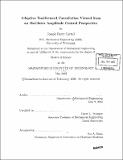Adaptive feedforward cancellation viewed from an oscillator amplitude control perspective
Author(s)
Cattell, Joseph Harry, 1977-
DownloadFull printable version (46.23Mb)
Other Contributors
Massachusetts Institute of Technology. Dept. of Mechanical Engineering.
Advisor
David L. Trumper.
Terms of use
Metadata
Show full item recordAbstract
This thesis presents methods of characterizing the convergence, error, stability, and robustness properties of Adaptive Feedforward Cancellation (AFC) for use on fast tool servos in high-precision turning applications. Previous work has shown that classical control techniques can be used to analyze the stability and robustness of an AFC loop. However, determination of the convergence and error properties of the closed-loop system to changes in the reference or disturbance signal is not an obvious output of these analyses. We have developed a method of viewing AFC from an oscillator amplitude control (OAC) perspective, which provides additional use of classical control techniques to determine the convergence and error properties of the closed-loop system. AFC is a form of repetitive control that can be used to significantly improve periodic trajectory following/disturbance rejection. Fast tool servos used in high-precision turning applications commonly follow periodic trajectories and develop large errors, which usually occur at integer harmonics of the fundamental spindle rotation frequency. We have developed a loop-shaping approach to designing multiple resonator AFC controllers and have implemented this design on a commercially available piezoelectric (PZ) driven FTS using a PC-based digital control system. Our view of Adaptive Feedforward Cancellation from an oscillator amplitude control perspective builds upon previous work in the literature. We use an averaging analysis to simplify the single resonator AFC system into two coupled single-input single-output (SISO) oscillator amplitude control loops and show that by using the correct rotation matrix, these loops are effectively decoupled. This simplification provides the use of classical control techniques to approximate the dynamics of the closedloop output to changes in the amplitude or frequency of the reference/disturbance signal. The simulated and experimental results conform well to our analytical predictions for sufficiently low gain values.
Description
Thesis (S.M.)--Massachusetts Institute of Technology, Dept. of Mechanical Engineering, 2003. Includes bibliographical references (p. 335-340).
Date issued
2003Department
Massachusetts Institute of Technology. Department of Mechanical EngineeringPublisher
Massachusetts Institute of Technology
Keywords
Mechanical Engineering.